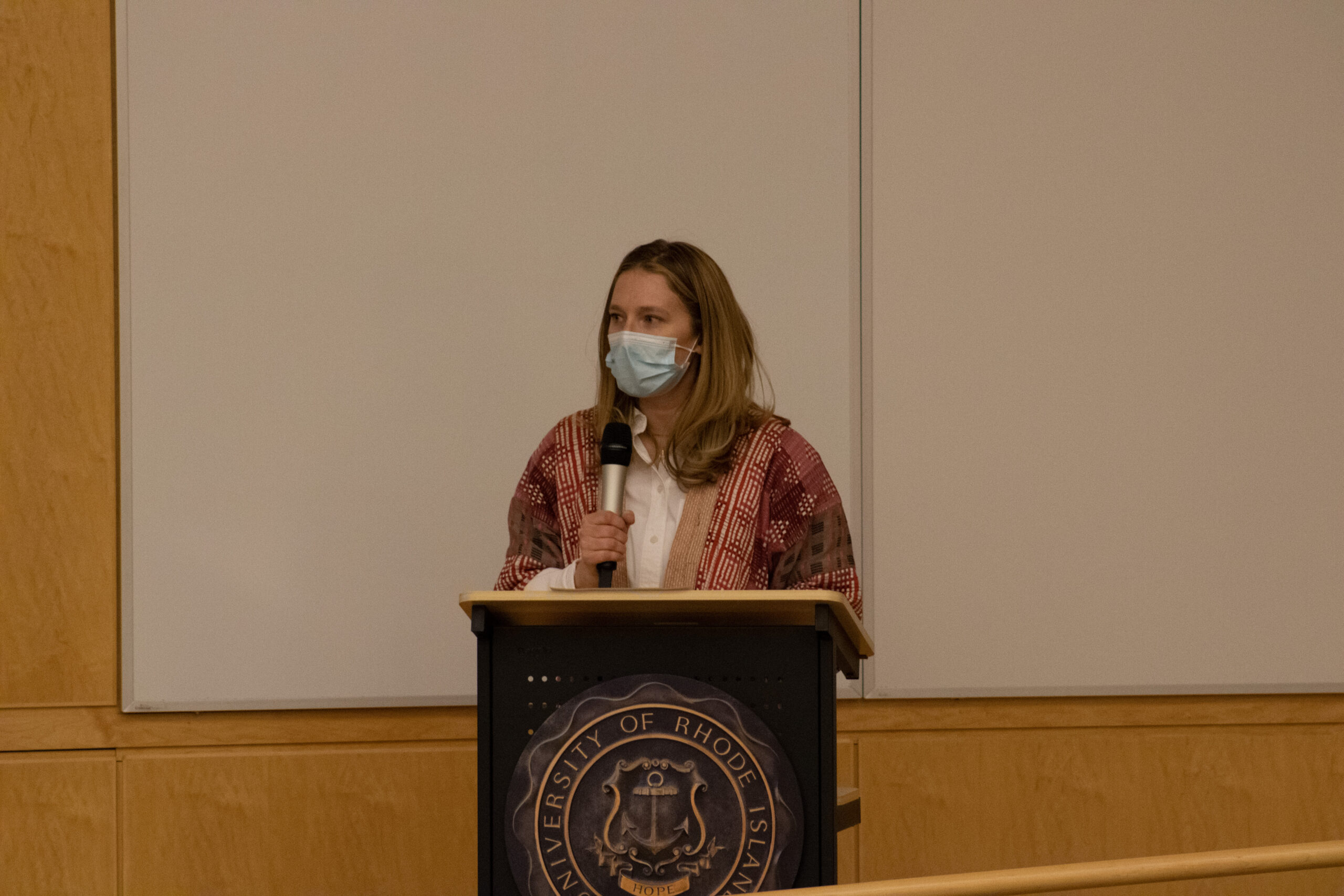Professor of Gender and Women’s Studies’ Alana Bibeau speaking at “Reproductive Rights as Human Rights: Women of Color and the Fight for Reproductive Justice.” PHOTO CREDIT: Eddie Melfi | Staff Photographer
Women of color are largely responsible for creating the reproductive justice movement that is known today, and according to reproductive justice scholar Zakiya Luna, their activism is often forgotten.
“Access to reproductive healthcare facilities is important, but if you don’t talk about people’s context and experience, you’re not going to get them in the door,” Luna said. “And you’re not going to get them in the movements, to advocate for more of those facilities, to advocate for more of those spaces.”
Luna explained how the reproductive justice movement became recognized as an issue over human rights in the University of Rhode Island’s annual Fredika Wild Schweers Lecture on Women and Health on Thursday, Feb. 2. Held through the University’s gender and women’s studies (GWS) department, Luna highlighted the history of this women’s rights movement in order to help people “understand themselves.”
This year’s GWS lecture served as a presentation of the findings in Luna’s book, entitled “Reproductive Rights as Human Rights: Women of Color and the Fight for Reproductive Justice” published by the New York University Press in 2020.
Currently, an associate professor of sociology and Dean’s Distinguished Professorial Scholar at Washington University in St. Louis, Missouri, Luna has centered her work around black feminist praxis.
During the lecture’s introduction, URI teaching professor of sociology Alana Bibeau said Luna’s research, teaching and community work have focused on human and reproduction rights, as well as social movements and intersectionality.
From publishing peer-reviewed articles to securing grants, Luna’s work to explore how human rights are misunderstood and misattributed has gone beyond lecturing.
Sociologists for Women in Society named her winner of the 2023 Distinguished Feminist Lecture Award at the organization’s banquet on Jan. 14, according to Bibeau. Luna’s book, “Reproductive Rights as Human Rights,” was also ranked number four on Oprah Daily in “The 12 Books You Need to Read Post the Supreme Court’s Roe. v. Wade Smackdown.”
Held in URI’s Paramaz Avedisian Hall auditorium, Luna’s lecture went through the long fight for reproductive justice — discussing how issues of slavery and eugenics tie into more contemporary human rights matters like second-term abortion.
The phrase “reproductive justice” was first developed in 1994 by Black women who attended a pro-choice conference in Illinois, according to Luna. These women sought to denote the concept of reproductive rights connected to social justice.
At its core, reproductive justice calls for birth control, abortion access, safe birthing practices and the ability to parent one’s child with dignity, according to Luna. The lecturer then explained how intersectionality greatly impacts an individual’s ability to access these rights.
Intersectionality refers to how the synthesis of social categories such as gender, race, class and sexual orientation create a unique experience for individuals. Even when people live in the same city and under the same laws, they can have unequal access to prenatal care, safe childbirth processes, the guarantee of a safe home environment and means of contraception.
As Luna explained how oppressed and marginalized women were impacted differently during times of no reproductive justice, she connected this issue to the fight for human rights.
The majority of the GWS lecture focused on the intersectional reproductive justice organization SisterSong, a group that, according to Luna, is the most associated with the reproductive justice movement. Founded in 1997, SisterSong categorized reproductive rights as a human rights issue — a matter separate from the civil rights movement — which was “unusual” at the time.
SisterSong’s mission is to “strengthen and amplify the collective voices of indigenous women and women of color to achieve reproductive justice by eradicating reproductive oppression and securing human rights,” according to the organization’s website. While SisterSong’s definition has been developing and expanding since 1997, the group has continued to highlight human rights as its core value.
Luna stated that her work combines research around human rights with sociology, political science and gender studies, in order to look more closely at how movements successfully make change in the world. This means answering the question of how these movements frame their issues in a way that successfully resonates with their communities. To do this, Luna turned to SisterSong and the concept of intersectionality.
“Human rights allow us to go broader,” Luna said. “It’s not just about somebody’s woke, right? People who identify as pro-choice and pro-life, a lot of them still pretty much remove people from their context. But we’re whole people, and we are whole people who have whole experiences or families. That’s part of the appeal.”
Because of a lack of engagement with human rights, the U.S. is “very much out of step” with other industrialized nations on the road towards reproductive justice, according to Luna. She hopes that by relating reproductive rights to human rights, more people will see themselves in the movement and start to advocate.

